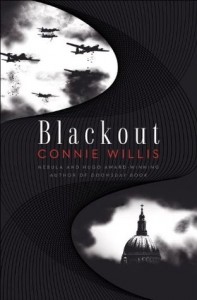 Welcome to the eight instalment of Dust Jacket, and the third in our series reviewing the 2011 Hugo Award nominees. This week, we’re travelling back in time to WWII London in Connie Willis’ Blackout.
Welcome to the eight instalment of Dust Jacket, and the third in our series reviewing the 2011 Hugo Award nominees. This week, we’re travelling back in time to WWII London in Connie Willis’ Blackout.
I’m flying solo this week, as Luke prepares for our frenetic final week of Hugo reviews.
WHAT YOU NEED TO KNOW
Blackout is the third in a series of novels about time travelling historians from Oxford University in the year 2060. The first two novels were Doomsday Book and To Say Nothing of the Dog. The fourth novel in the series, All Clear, is the sequel to Blackout and was also published in 2010.
Three time-travelling historians from Oxford University in the year 2060 are sent back in time to WWII London to document the historical events of the time. Mike Davies is meant to be at Dover, documenting the evacuation of British troops from Dunkirk. Polly Churchill is sent to Blitz-era London to catalogue the experiences in the bomb shelters. Merope Ward (calling herself Eileen) is a servant in an English manor in the countryside, where child evacuees from London have been sent. Each has been sent to their location due to last-minute changes in the Oxford time-travel program, leaving them less than fully prepared to handle the time and location they find themselves in.
Arriving at different times during the war, they each find themselves stranded and unable to return to the present, while war rages around them.
WHAT WE THOUGHT
The most striking aspect of Blackout is the vivid and incredibly detailed depiction of war-era London that Willis presents. The various 40’s characters and situations seem real to me and I really felt like I was gaining an accurate insight in to the people and the times. It’s clear that Willis has done her research; she even acknowledges the “marvellous group of ladies at the Imperial War Museum…women who, it turns out, had all been rescue workers and ambulance drivers and air-raid wardens during the Blitz.” This attention to detail and clearly exhaustive research enables Willis to ground the more fantastic time travel elements of her story in a real-world setting and create a compelling backdrop for her story.
Unfortunately, Blackout fails to capitalise on this backdrop by producing a less that satisfying story with dull and lifeless characterisation and a decompressed, meandering writing.
As POV characters designed to draw us into the world of Blitz-era London, time travellers Mike, Polly and Eileen fail to stand out as individual in any way. They are all essentially the same character, with almost no variation in personality or motivation. They’re all time-travelling historians, they all have a specific event they’d like to witness during WWII, and they’re all annoyed at their supervisor because he’s changed their assignments at the last minute and sent them to places they’re not properly equipped to handle. Each of the time-travellers is essentially a cipher, designed to impart information in a series of frustrating inner monologues that give no insight into the characters at all and actually draw us out of the story and setting.
These monologues follow a basic pattern: a “contemp” (a contemporary citizen, i.e. a local in the time period) making an observation or posing a question, and one of the time-travellers answering it in an internal monologue. Should we go to Madame Tussuad’s, one contemp might ask, followed by our erstwhile time traveller thinking “No, you can’t. Madame Tussaud’s was bombed on the eleventh.” But, as we are constantly reminded, they can’t actually tell the contemp that. While interesting at first, this pattern quickly grows dull and monotonous.
Despite their seemingly endless wealth of knowledge, our protagonists aregrossly ill-equipped to handle even the most basic of deviations to their time-travelling plans, leading me to question how it is that they were cleared for time travel in the first place. Is the Oxford time travel program of 2060 so desperate for historians that they would choose incompetents to handle these important and potentially dangerous assignments? Even with the last minute changes to their destinations, surely these people have been trained to improvise and adapt to their conditions. These are no accidental time travellers; they’ve supposedly been hand-picked from the Oxford elite to handle these kinds of assignments.
Many and varied are the instances of this incompetence. When Polly gets a job as a sales clerk at a department store, she frets over lacking the appropriate uniform. Yet she has been given plenty of money before her trip and could easily buy the outfit she needs from the very department store she works in. Eileen is unable to handle two unruly children at the mansion. Mike spends more time being knocked than actually achieving anything of value. Infact, none of the protagonists really accomplishes much of anything during the novel.
Unfortunately, the plot fares no better. For more than 250 pages we’re subjected to a detailed portrait of life during wartime, but with almost no story to hook us and no compelling protagonists to carry us through. By the time Willis finally gets around to introducing the hook – revealing that the time travellers are in the wrong places and that their actions may potentially be changing the future – I no longer cared. The level of plot decompression was so extreme that I would have given up on the novel well before this if not for my need to complete this review. Even after the introduction of the twist, the story remains so long-winded and drawn out that by the end of the novel, I have no interest in continuing. Essentially, the twist serves only one purpose; it allows the leads to stand around fretting over the fact that no retrieval teams are coming to rescue them and they’re left stranded. Not exactly exciting reading.
Despite all of her research, Willis also makes some admittedly minor mistakes, introducing several American terms and references into the story and presenting the occasional historical inaccuracy. While not as frustrating as the plot or characters, it is surprising to note the use of American terminology by British characters and to see errors in her timeline. Apparently her research wasn’t quite as thorough as she thought, which is somewhat jarring in a novel that presents itself as a historically accurate depiction of the times.
The novel ends with a note: “For the riveting conclusion to Blackout, be sure not to miss Connie Willis’ All Clear. “ That’s right: after 490 terribly dull and decompressed pages, I don’t even get a satisfying conclusion. There’s a whole other novel to read to get the complete story. Unfortunately, there’s nothing in Blackout that convinces me that I should track down All Clear to get the rest of the story.
Blackout suffers from a lack of editing and Willis’ seeming inability to reign in her writing style. I’m sure that with the right level of trimming and a greater economy of language she could have turned this and All Clear into ONE serviceable stand-alone novel. Instead, we have one half of a horribly decompressed story that fails to hold the reader’s attention despite some solid research and an interesting backdrop. 2 Lukes.
IS IT HUGO WORTHY?
Connie Willis is a ten-time Hugo Award winner. Her two Oxford time travel novels prior to this one – Doomsday Book and To Say Nothing of the Dog – both won the Hugos in their respective years. I’d say this ranks her as a definite favourite to win this year’s award. It probably helps that both Blackout and its sequel All Clear have been nominated together as a single story. I don’t think Blackout is worthy of the win, but I can certainly see it taking home the prize.
WHAT DO YOU THINK?
Is Blackout Hugo worthy, or are my criticisms of Willis’ overblown novel accurate. Let us know what you think. Send us your comments, criticisms and, most importantly, your votes! Help us compile the definitive list of Greatest Sci-Fi Masterpieces
THE RANKINGS
POSITION TITLE AUTHOR RANKING
1 Foundation series Isaac Asimov 4.5
1 The Forever War Joe Haldeman 4.5
2 The City and the Stars Arthur C. Clarke 4
3 Non-Stop Brian Aldiss 3.5
4 Player of Games Ian M. Banks 3.25
5 Cryoburn Lois McMaster Bujold 2.25
6 Blackout Connie Willis 2
7 Feed Mira Grant 0.5
BEHOLD…THE FUTURE!
With just seven days to go before the announcement of this year’s Hugo award winner, things are heating up here at Dust Jacket. We’re giving you two reviews next week, beginning with Ian McDonald’s The Dervish House on Tuesday. So join us in just 3 days as Hugo month continues at NCP.








